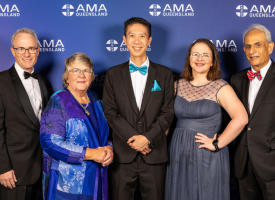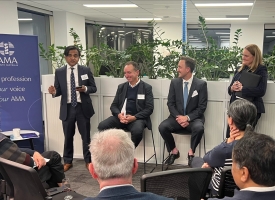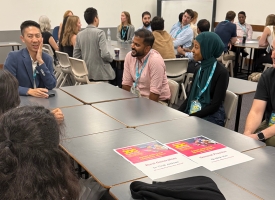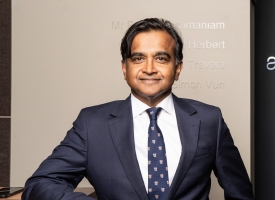Transcript: ABC Radio Adelaide - AMA SA's State Budget priorities
AMA SA President Associate Professor Peter Subramaniam, spoke to ABC Radio Morning hosts Jules and Sonya about AMA SA's State Budget priorities and the need to invest revenue raised from the payroll tax into healthcare.
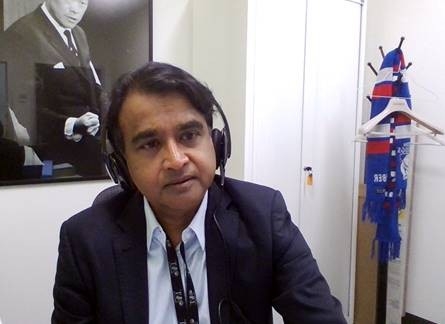
Transcript: AMA SA President Associate Professor Peter Subramaniam on ABC Radio Mornings with Jules and Sonya.
(3 June, 2025)
Subjects: payroll tax, workforce sustainability, general practice, international medical graduates, bulk billing
Presenter: Well, we're two days out from the state budget, and it does seem that doctors over the last course of the year are still talking about payroll tax—maybe in a bit of a different way. GPs, of course, were slugged with payroll tax for contractors, the definition of contractors working in their businesses. But this budget, the doctors are still talking about it. How are they, though? Let's talk with Associate Professor Peter Subramaniam. He's President of the AMA here in South Australia. Good morning to you, Professor.
A/Prof Subramaniam: Yeah, good morning, Sonya, and good morning, Jules, and also good morning to your listeners.
Presenter: Now, Doctor, this of course caused a lot of controversy amongst GPs, who were very unhappy that this retrospective payroll tax for contractor doctors was imposed. What are you hoping to see in this year's state budget?
A/Prof Subramaniam: Well, I think it's obvious to everyone that we have two problems we need to fix. One is what now seems like a normal event in our hospitals—ambulance ramping. But I think the more critical problem is making sure we have the right number of doctors in the right places to treat the problem. That’s the primary issue. The symptom is ramping. And we feel the budget should invest in a targeted way in a resilient workforce.
Presenter: So how does that relate to payroll tax, Peter?
A/Prof Subramaniam: Payroll tax has generated income and revenue for the government. That money has to be reinvested in the health system. The way to do that is by creating more resilience in the GP workforce, because that’s where we can actually tackle the issue of hospital ramping. Early intervention—studies show, both in Australia and overseas—reduces hospital presentations. It’s a pretty simple equation.
Presenter: So when you say resilience, do you mean more GPs?
A/Prof Subramaniam: Yeah. The government announced when it was elected that it would increase the number of doctors, and it certainly has done that—and that’s acknowledged. But even with that increase, we’re still seeing ambulance ramping at record highs. So I think it’s about investing in the right number of doctors in the right places. And right now, that’s in general practice—primary care.
Presenter: So you would like to see, from the sounds of it, the increased revenue from payroll tax directly invested in the GP side of health, not just in a general health bucket?
A/Prof Subramaniam: Yeah, GP is one area. But I think the smart investment is also in the digital transformation of the system. A lot of times, patients are caught in this sort of quagmire between GP and specialist care. That’s created by a lot of complexity. Digital transformation is an opportunity to address that.
Presenter: When you say that—because I’ve experienced this in the last year with scripts—I go on an app, I contact my doctor through the app, and then I think for about $20, he SMSs me the script. Is that what you mean by digital transformation? Because it saves me a visit to the GP?
A/Prof Subramaniam: No, I think it’s more than that. It’s about connecting the care. When you have fragmented care—like Jules, you needed a script—but say you also needed a check-up, a blood pressure check, your annual check-up, cholesterol, and so on. You don’t want digital transformation to replace face-to-face care with your doctor. You want it to enhance that. So it’s more than just scripts. It includes things like e-referrals, ensuring good communication between GPs and specialists, both in the public and private systems, so we can keep the health journey moving for our patients.
Presenter: Since this was announced, doctors—and the AMA in particular—have been very vocal against the payroll tax imposition. Is this a concession that it’s here to stay and that you no longer oppose it?
A/Prof Subramaniam: No, we oppose it. And we’ve made that position clear—both here and in other states. You’d be interested to know that in Queensland, as part of the election of the new government, they exempted GPs from payroll tax. We see payroll tax as an imposition on access to GP care. If you make it more difficult for doctors to practise, they’ll either have to charge a fee, which discourages patients from attending, or they’ll stop offering services. Those patients then delay care and end up in EDs, which costs the system more than the revenue raised.
Presenter: What’s happening to bulk billing rates? Because we’re going to have the Federal Health Minister in the studio later this week, and obviously the federal government—or the Labor Party—promised that bulk billing rates would increase because of their policies. Are you hearing that amongst your brethren, Peter?
A/Prof Subramaniam: Oh yeah—my brethren and the sisterhood of GPs as well, Jules. We welcome any incentive that increases access to care. But our concern is that the $8.5 billion investment into health to improve bulk billing won’t deliver on its promise. It’s tied to a timed consultation. You want to invest in good outcomes, not just a metric. If increased bulk billing rates lead to shorter, less effective consultations, that’s not in the community’s best interest. That’s where the $8.5 billion investment may fall short.
Presenter: In relation to bulk billing rates—but getting back to the payroll tax side of things—was there not an exemption that the state government put in for practices that engaged GPs who chose to bulk bill?
A/Prof Subramaniam: Yes, that was the concession—that income derived from bulk-billed patients would not attract payroll tax. But the problem is the cost of delivering care is still higher than the bulk billing rate. That’s the key element that isn’t really discussed. If the cost of delivering care is higher than the bulk billing rate, then even if you exempt that income, it doesn’t relieve the financial pressure on small, rural, or regional GP practices. And we know how important those practices are.
Presenter: So as a result of that decision, have we seen in the last year more GPs employed who bulk bill because of that exemption?
A/Prof Subramaniam: No. In fact, we’re seeing something of a paradox. Some GP practices are starting to close. Some are starting to impose—or increase—co-payments. Practices that traditionally charged a small co-payment have had to raise it. The key issue—and we’ve discussed this with the Minister—is that we have a set of beliefs the government doesn’t share. Let’s measure it. Let’s agree on how to assess whether bulk billing is making it harder for patients to access care. And let’s look at the data. That data hasn’t been published yet, and it would be an important piece of information to guide policy.
Presenter: You're listening to Associate Professor Peter Subramaniam. He is President of the AMA in SA. Before you leave us, Professor, where are we accessing our GPs from? Because we’ve covered this for a long time—that we’re not training enough doctors for the system in Australia. Are we still going out to the UK and other parts of the world to supplement the workforce?
A/Prof Subramaniam: I'm glad you asked that question because that's one of my focus areas in the couple of years that I'll be leading the AMA here. When we talk about workforce resilience, we're talking not just about making sure we treat the problem we have today, but also the problem that we're likely to have in three, five, and ten years. 33% of the GP population are international medical graduates. But if you want to train a GP workforce for tomorrow, you've got to start today. We need, in South Australia, to make it attractive to come to South Australia, to go to the areas where there is need, and to stay in South Australia. So it's about retention, it's about attraction, but it's also about training a pipeline of GPs and specialists who want to stay here in South Australia.
